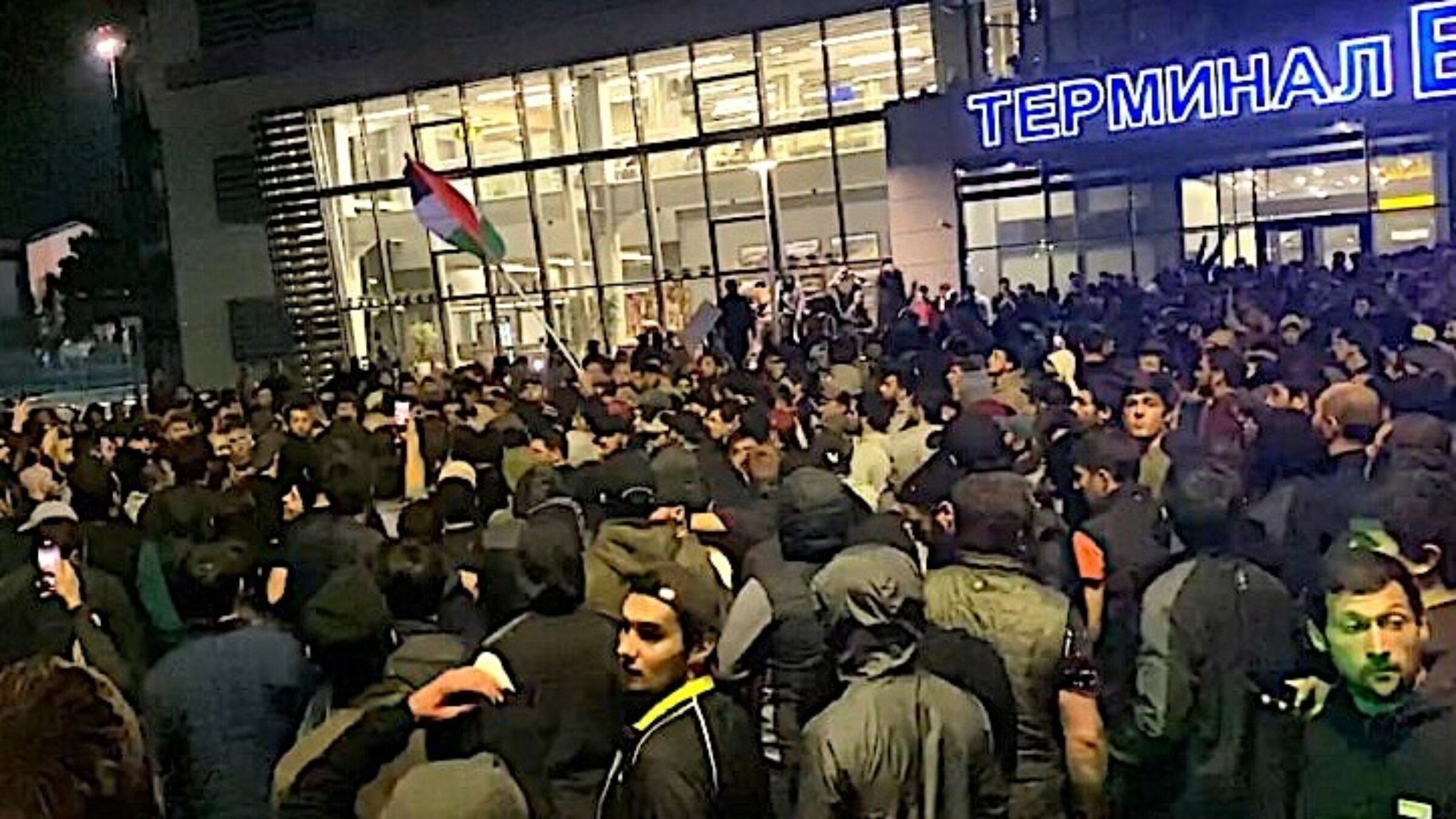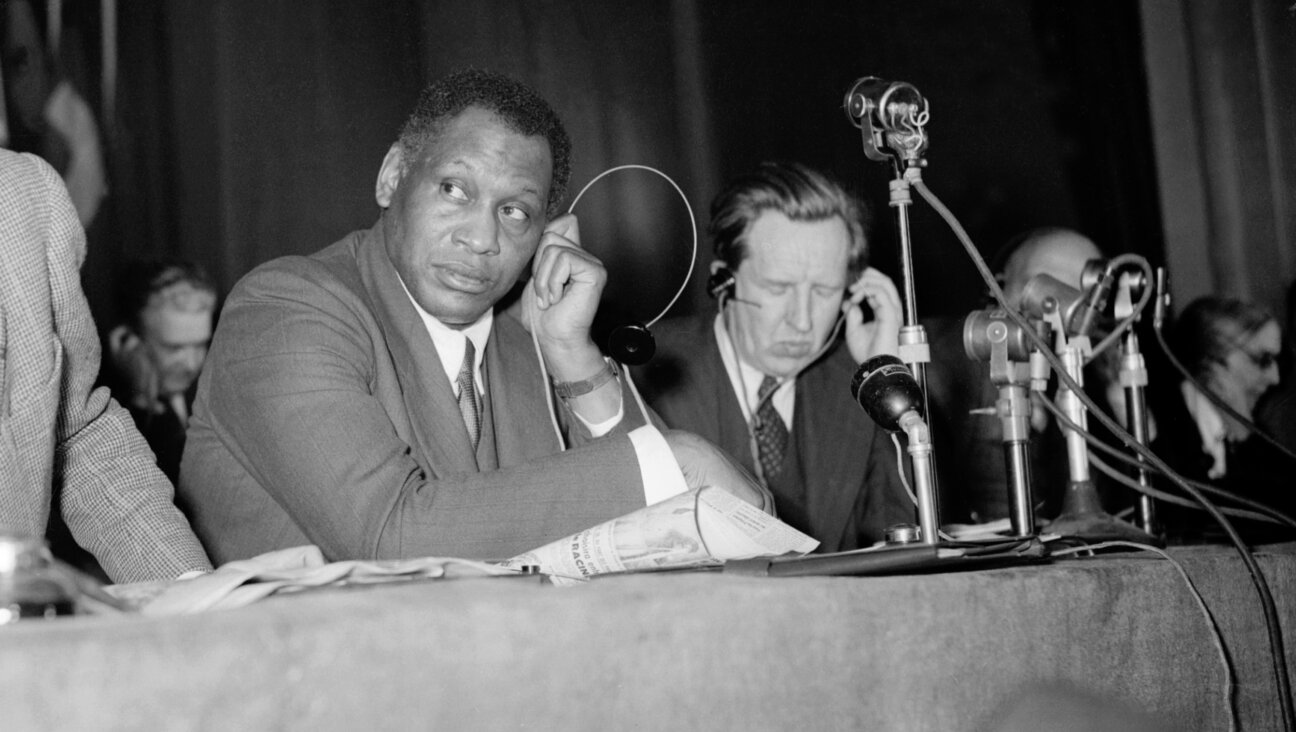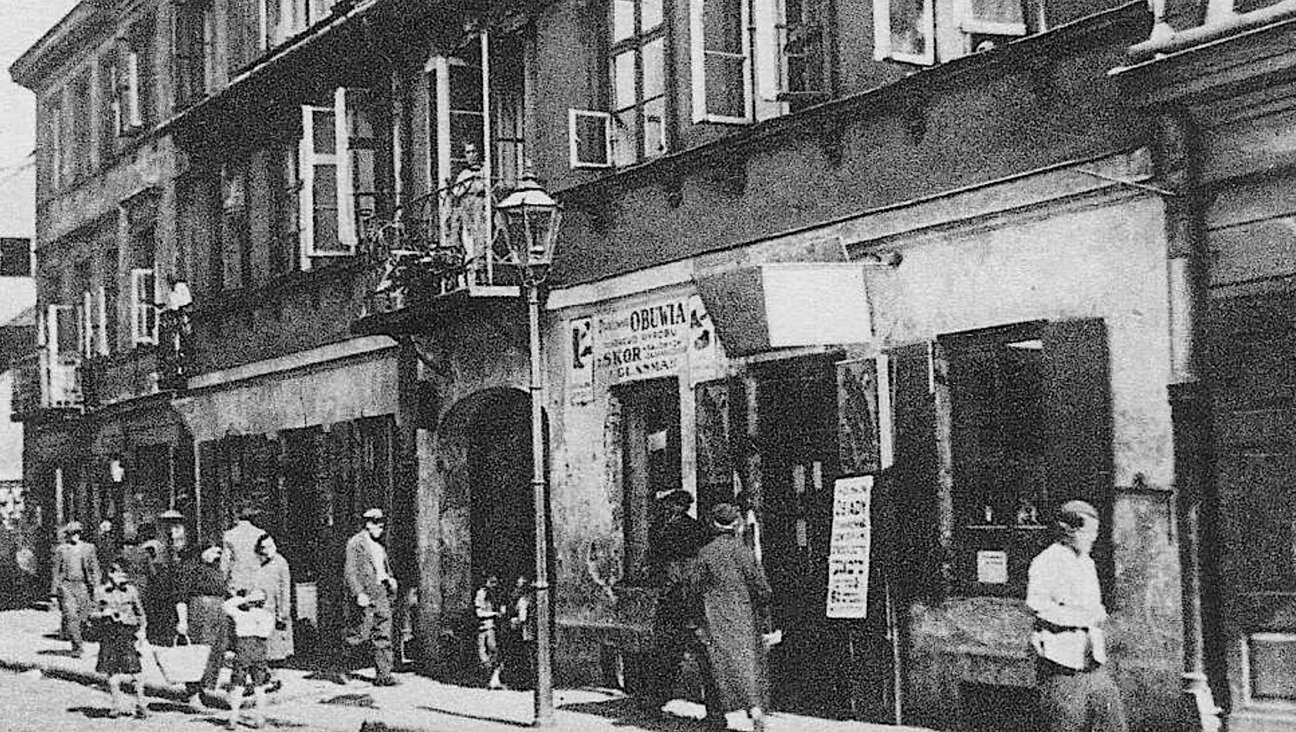The Dagestan airport riot — Russia’s first 21st-century pogrom
A video filmed during the riot shows teenagers saying ‘we’re here to find the Jews and kill them’

Rioters near the Dagestan airport terminal. Photo by Vladimir Petlyuk
A Russian Jew receives a call from a relative in Israel.
“What’s up? I’ve heard there’s something scary going on.”
“Yeah, Dagestan has declared war on the Jews.”
“Are there any losses?”
“The Dagestanis lost an airport, the Russians lost a plane, 10 locals were wounded.”
“What about the Jews?”
“Brother, you won’t believe it … They haven’t even arrived yet.”
This joke circulating on Russian Jewish social media is based on what’s been called Russia’s first pogrom of this century. On Oct. 29, an angry mob attacked Makhachkala Airport in Dagestan, Russia, after the arrival of a flight from Tel Aviv. When the plane landed, rioters set up a makeshift checkpoint on the road leading from the airport to the city. They stopped every car leaving the airport grounds and asked if any of the passengers were Jewish or Israeli.
When the rioters realized the passengers were still inside the plane, they stormed the airport terminal. Hundreds of people holding Palestine flags and shouting “Allahu Akbar” managed to get to the tarmac; some climbed on to the plane’s wings. They were looking for Jews everywhere, even in the plane’s engine. A video filmed during the riot shows teenagers saying, “We’re here to find the Jews and kill them.”
The police were there but reluctant to act for the first few hours. The Tel Aviv plane’s passengers, many of them dual Russian-Israeli citizens, were eventually evacuated by bus. The bus was chased by some of the rioters yelling curses and throwing stones. At least one passenger was hurt. After the passengers were brought to a safe place, a few rioters were arrested, but most left on their own and got away with it.
The airport pogrom wasn’t the only antisemitic incident in the North Caucasus in the past few weeks. Just a day earlier, a group of people had gathered near a small hotel in Khasavyurt, Dagestan. They claimed Israelis were staying at the hotel and demanded that all guests come out and disclose their identity. When the hotel guests refused to do so, stones were thrown at the windows. In the end, local police officers arrived and, shockingly, let the protesters enter the hotel to make sure it was “Jew-free.” Luckily, it was.
In another North Caucasus city, Nalchik, a Jewish community center building was set on fire and smeared with the words “Death to the Yahuds.” The building was still under construction and thus empty; no one was hurt.
The Mountain Jews of Dagestan
Dagestan is an autonomous republic in Russia’s North Caucasus which borders Azerbaijan and the Caspian Sea. It’s home to a number of indigenous ethnic groups, most of them overwhelmingly Muslim, and a unique, long-established Jewish community called the Mountain Jews.
Unlike the Ashkenazi majority of Russian Jews, this community is often classified as Mizrahi. The Mountain Jews of Dagestan are descended from a group of Persian Jews who migrated north and crossed the Caucasus mountains well over a millennium ago. They eventually adopted the dress and the cuisine of their indigenous, Muslim neighbors. Historically, the Mountain Jews had the reputation of fierce warriors and — unlike many other Jewish communities — lived in rural areas and engaged in agriculture.
During the Soviet era, virtually all Mountain Jews moved to urban localities, most notably Dagestan’s second-largest city, Derbent.

“It’s hard for us in Dagestan. People are stressed and worried,” Rabbi Ovadia Isakov, head of a Mountain Jewish synagogue in Derbent, Dagestan, said to the Russian news outlet Podyom. “They’re calling me, and I don’t know what advice to give. A local Jewish lady contacted the police saying she felt unsafe because of antisemitic threats. The police officer she got in touch with said, ‘Well, you know what your people are doing to the children of Gaza,’ and refused to help.”
He said there were 300 to 400 Jewish families in Derbent alone, and just as many in the rest of Dagestan. According to Isakov, all of them might need urgent evacuation if tensions escalate further. “But I’m not sure where we should go, as nowhere in Russia is truly safe for Jews. There have been pogroms in non-Muslim regions, too,” he added.
Disinformation on social media
What caused this sharp increase in antisemitic violence in the North Caucasus? Experts agree that a lot of it was incited by a network of online groups on the Russian messaging app Telegram. The largest of these groups, Dagestan Morning, has been linked to the former Russian legislator Ilya Ponomarev, who moved to Ukraine and rebranded himself as a Putin opponent. Ponomarev confirmed that he helped finance and promote the group when it was created but claimed he had since then lost contact with its owners and wasn’t aware of what they were posting.
Dagestan Morning was spreading disinformation and managed to convince its 55,000-strong audience that “numerous Jewish refugees from the war in Israel were coming to Dagestan to settle and steal the land from the locals like they did in Palestine.”
This claim seems nonsensical, but surprisingly, it wasn’t made up by the Telegram group out of thin air. A week before the airport pogrom, Jerusalem-based Russia House, a Russian government-owned soft power organization, made a post promoting the “repatriation” of Russian-speaking Israelis to Russia and specifically suggesting Dagestan as a great location to move to. It is not known if this was a provocation or a coincidence, but Russia House took down the post on Oct. 29.
‘People are tired and angry’
No matter how the rumors appeared, why did so many people believe them? Why were hundreds of Dagestanis ready to break the law and storm an international airport because of social media posts? Experts claim it could be explained by a high degree of social stress and hidden dissent combined with a lack of trust in Russia’s mainstream news sources.
“When I heard the news, I was shocked,” said Magomed, 21, a Dagestani man from a secular family of culturally Muslim background.
“But knowing our people, it’s not something one could rule out as impossible. The people of Dagestan are extremely tired and angry. They are subject to discrimination and forced to live in terrible conditions with frequent blackouts and, recently, a lack of stable water supply, all while their family members are being sent to the war in Ukraine.”
The discrimination Magomed mentioned refers to the way Dagestanis are often treated by government officials and members of the Slavic ethnic majority elsewhere in Russia. This includes violent attacks on people wearing Muslim attire. According to the Dagestani blogger Maryam Alieva, many Russians view Dagestanis as “uneducated savages, rather than representatives of a unique culture with roots going back to the Persian and Byzantine empires.”
Studies by Russian sociologists show that job seekers with Dagestani-sounding names are among the least likely to be invited for an interview in cities like Moscow and St. Petersburg. Numerous Dagestani activists have been arrested and imprisoned on fabricated charges of “extremism” and “terrorism.”
“Dagestanis have no way to influence Russia’s policy and feel like a neglected colony. Naturally, they feel solidarity with the civilians of Gaza. Finding a scapegoat, in this case, the Jews, is a shameful but easy way to let off steam,” Magomed concluded.
Since the Oct. 29 pogrom, there have been no known cases of antisemitic violence in the North Caucasus, although hate speech is still abundant on social media. Telegram moderators recently banned some of the larger groups that incited the riots.
A Mountain Jewish Dagestan resident who preferred to stay anonymous said most members of the community were not in fear of immediate danger anymore, but more people were thinking of making aliyah than before.
A message from our Publisher & CEO Rachel Fishman Feddersen

I hope you appreciated this article. Before you go, I’d like to ask you to please support the Forward’s award-winning, nonprofit journalism during this critical time.
At a time when other newsrooms are closing or cutting back, the Forward has removed its paywall and invested additional resources to report on the ground from Israel and around the U.S. on the impact of the war, rising antisemitism and polarized discourse.
Readers like you make it all possible. Support our work by becoming a Forward Member and connect with our journalism and your community.
— Rachel Fishman Feddersen, Publisher and CEO























